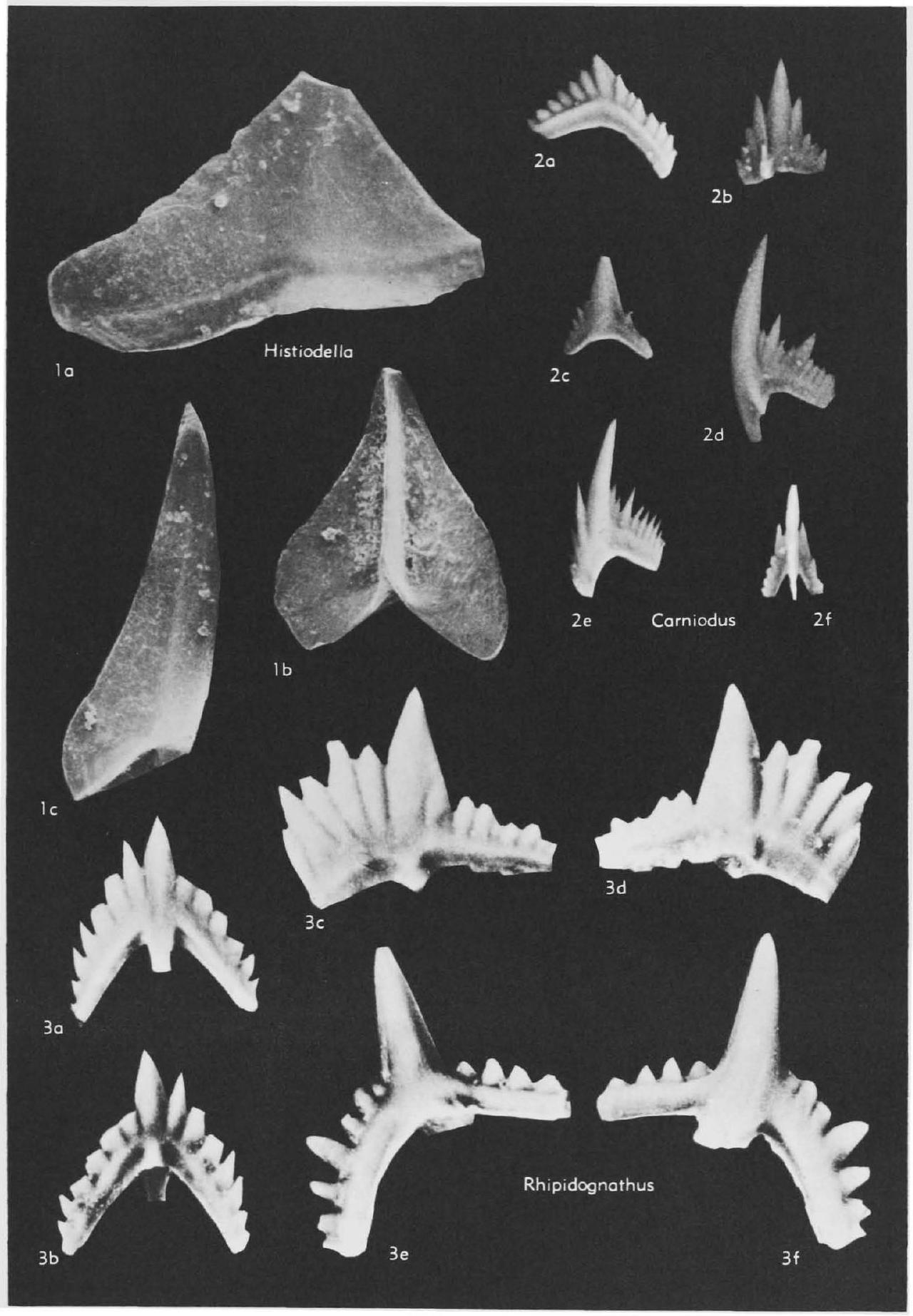Welcome to the Treatise on Invertebrate Paleontology!
Please enter a genera name to retrieve more information.

Rhipidognathus
Classification
Phylum:
Conodonta
Class:
Conodonta
Order:
Conodontophorida
Superfamily:
Prioniodontacea
Family:
Rhipidognathidae
Formal Genus Name and Reference:
Rhipidognathus Branson, Mehl, & BRANSON, 1951, p. 10
Type Species:
R. symmetrica, OD
Images
(Click to enlarge in a new window)
Fig. 81, 3. R. discretus Bergström & Sweet, M.Ord. (Catheys F.), USA (Tenn.), 3a, b, alate element, ant., post. views, 3c-f, two types of angulate elements, lat. views, X31 (Bergström & Sweet, 1966)
Synonyms
Geographic Distribution
N.Am.
Age Range
Beginning Stage in Treatise Usage:
M.Ord.
Beginning International Stage:
Dapingian
Fraction Up In Beginning Stage:
0
Beginning Date:
471.26
Ending Stage in Treatise Usage:
U.Ord.
Ending International Stage:
Hirnantian
Fraction Up In Ending Stage:
100
Ending Date:
443.07
Description
Apparatus trimembrate, including alate and two types of angulate elements, Alate elements bilaterally symmetrical to slightly asymmetrical, anteroposteriorly compressed, convex anteriorly and concave posteriorly, without posterior process but with anterobasal boss, One type of angulate elements arched to almost straight, slightly bowed, other type distinctly arched and bowed, both types with stout cusp, All elements with numerous subequal denticles along upper margins of processes, in some forms denticles laterally compressed and partially confluent laterally, in others denticles rounded and discrete, Basal cavity developed as subapical pit and shallow grooves along processes. [Apparatus reconstruction: BERGSTROM & SWEET, 1966.]
References
Branson, E. B., & Branson, C. C., , & Mehl, M. G., , & Branson, C. C., 1951, Richmond conodonts of Kentucky and Indiana: J. Paleontol., v. 25, p. 1-17, 1 text-fig., pl. 1-4.
Museum or Author Information
Classification
Phylum:
Conodonta
Class:
Conodonta
Order:
Conodontophorida
Superfamily:
Prioniodontacea
Family:
Rhipidognathidae
Formal Genus Name and Reference:
Rhipidognathus Branson, Mehl, & BRANSON, 1951, p. 10
Type Species:
R. symmetrica, OD
Images
(Click to enlarge in a new window)
Fig. 81, 3. R. discretus Bergström & Sweet, M.Ord. (Catheys F.), USA (Tenn.), 3a, b, alate element, ant., post. views, 3c-f, two types of angulate elements, lat. views, X31 (Bergström & Sweet, 1966)
Synonyms
Geographic Distribution
N.Am.
Age Range
Beginning Stage in Treatise Usage:
M.Ord.
Beginning International Stage:
Dapingian
Fraction Up In Beginning Stage:
0
Beginning Date:
471.26
Ending Stage in Treatise Usage:
U.Ord.
Ending International Stage:
Hirnantian
Fraction Up In Ending Stage:
100
Ending Date:
443.07
Description
Apparatus trimembrate, including alate and two types of angulate elements, Alate elements bilaterally symmetrical to slightly asymmetrical, anteroposteriorly compressed, convex anteriorly and concave posteriorly, without posterior process but with anterobasal boss, One type of angulate elements arched to almost straight, slightly bowed, other type distinctly arched and bowed, both types with stout cusp, All elements with numerous subequal denticles along upper margins of processes, in some forms denticles laterally compressed and partially confluent laterally, in others denticles rounded and discrete, Basal cavity developed as subapical pit and shallow grooves along processes. [Apparatus reconstruction: BERGSTROM & SWEET, 1966.]
References
Branson, E. B., & Branson, C. C., , & Mehl, M. G., , & Branson, C. C., 1951, Richmond conodonts of Kentucky and Indiana: J. Paleontol., v. 25, p. 1-17, 1 text-fig., pl. 1-4.
